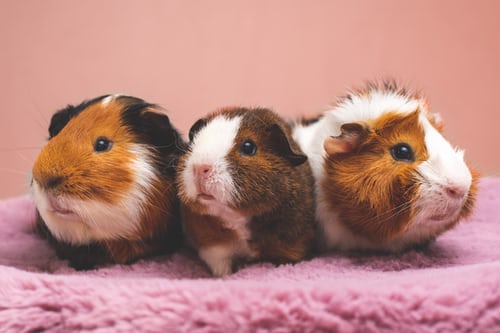Just as with every other pet you may have, you must closely monitor your Guinea pigs’ health. Ensure that they have a good diet and are walking and digesting properly. When it comes to the guinea pig, you must have additional care.
This article will go through everything that you need to monitor to ensure that your guinea pig is in good form.

Signs Of Potential Problem
You may want to look out for these signs;
– Drastic changes in weight
– Changes in drinking habits
– Changes in feces consistency
– Shift in behaviors (more sleepy or more active)
– Eyes or nose discharge
– Seizures
– Hair loss

Guinea pigs have an excellent ability to conceal illness and pain. Get to know your guinea pigs’ habits; if they’re acting strangely, it could mean something’s wrong. If your guinea pig exhibits any of these symptoms, please contact your veterinarian as soon as possible. Guinea pigs should also receive regular veterinarian check-ups to detect abnormalities such as overgrown teeth or parasites before they become a severe health issue.
You should be looking for the following common problems in your Guinea pig.
Feces
It’s important to note that Guinea pigs have two different types of droppings. One kind of dropping contains “regular” waste; these droppings are shaped like elongated baked beans and mid to dark brown.
They also create caecotrophs, which are soft, nitrogen-rich feces derived from the animal’s caecum and include some vitamins and minerals that the guinea needs to reingest. Guinea pigs are known to devour their caecotrophs after passing them. This does not imply a dietary shortfall or anomaly, and, usually, guinea pigs do so.
Dentition
Dental illness is pretty frequent in guinea pigs, and it is generally caused by a shortage of roughage, which causes the guinea pigs’ teeth to wear down as they grow. To wear down their teeth, they must chew fibrous food for long periods throughout the day. Dental illness in guinea pigs causes a lot of pain and discomfort, and it can be avoided by feeding the proper diet.
Guinea pigs have evolved to eat a high-fiber diet over thousands of years. Wild guinea pigs primarily consume grass throughout the day in their natural habitat. Pet guinea pigs should be fed similarly, with a diet consisting mainly of grass and/or grass hay, as well as fresh leafy green vegetables.
Of course, dental problems may lead to other more profound issues such as weight loss due to difficulty chewing.
Vitamin C Deficiency
Guinea pigs, like humans, cannot produce vitamin C from other dietary items; thus, they must get it from their diet. Fresh leafy green veggies are generally sufficient in this regard. Supplementing tiny amounts of vitamin C-rich foods like citrus or kiwi fruit is a safer option. Vitamin C must be obtained straight from the foodstuffs. Liquid vitamin C supplements which you can add to their drinking water or processed vitamin C added to commercial feeds, are not trustworthy sources of vitamin C and are therefore not suggested.
Vitamin C deficiency will bring other complications such as swollen joints, muscle bleeding, or other intestines issues.

Parasites
Like other pets, guinea pigs are prone to having fleas and mites. They may cause itchiness, hair loss, and discomfort in general. You should talk to your vet about preventive measures that you can adopt to avoid this issue and treatments.
Whenever you are done treating the issue, you should clean your pet housing and places they used to hang out to ensure they do not contract any other parasites again.
Problems with the urinary tract
Inflammation, infection, and bladder stones are frequent in guinea pigs’ urinary tracts. These are frequently linked to poor diet and hygiene. A high-calcium diet can raise the risk of urinary tract disorders.
Breathing issues
Respiratory infections in Guinea pigs are frequent. Poor housing conditions, such as insufficient ventilation, poor hygiene, and dusty, improper bedding, are frequently blamed. If your guinea pig has abnormal breathing, please contact your veterinarian as soon as possible.
Your pet must have access to clean water, proper sanitation (clean their house and bedding often). Place them somewhere with adequate ventilation. Let us know in the comment if your guinea pig has encountered any of the above problems…
